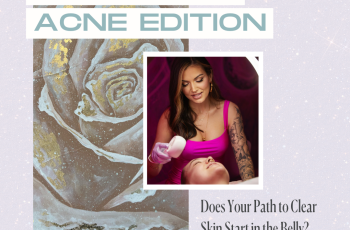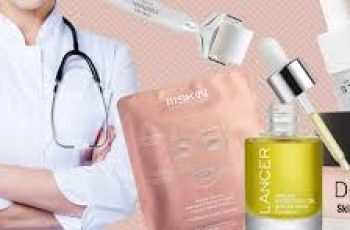
What Should You Not Mix Vitamin C With?
Vitamin C is one of the most celebrated ingredients in skincare. Its potent antioxidant properties help to rejuvenate the skin, reduce dark spots, and combat free radical damage.
However, there are some common questions around which ingredients you should avoid mixing with vitamin C.
Many people are unsure about how to incorporate vitamin C into their skincare routine without causing irritation or negative reactions.
So, in this article, we’ll explore which products you should avoid combining with vitamin C and which ingredients work best alongside it.
What Can You Not Mix with Vitamin C?
While vitamin C has incredible benefits, it is considered slightly unstable, especially when mixed with other potent ingredients.
It has a more acidic pH level, which means it can be challenging to combine with certain active ingredients. Here are the main ingredients you should avoid mixing with vitamin C:
Vitamin C and Retinol
Retinol is another powerhouse ingredient known for its anti-aging properties. It boosts collagen production, speeds up skin cell turnover, and promotes a firmer, youthful complexion.
However, using vitamin C and retinol together is not recommended. Both are highly effective ingredients, but they work best on their own.
The problem lies in the pH levels. Vitamin C is acidic, while retinol works best in a neutral to slightly alkaline environment.
When used together, they can neutralize each other, reducing their effectiveness. Additionally, using both can cause excessive irritation, redness, and peeling, especially for sensitive skin.
To make the most of both ingredients, you can use them at different times of the day.
Apply vitamin C in the morning, followed by a broad-spectrum SPF (minimum SPF 30), as vitamin C can make the skin more sensitive to the sun.
Use retinol at night as its potency is most effective during the evening and will not be compromised by sunlight.
Vitamin C and Niacinamide
Niacinamide, or Vitamin B3, is a versatile ingredient used in many skincare products for its ability to hydrate, regulate sebum production, and improve skin texture.
However, mixing niacinamide with vitamin C is a controversial topic in the skincare community.
Many believe these two ingredients don’t work well together because they can counteract each other’s effects.
Niacinamide is known for being a soothing and anti-inflammatory ingredient, whereas vitamin C is a potent brightening agent. When used together, niacinamide can reduce the effectiveness of vitamin C.
This means that applying them in the same routine might not deliver the full benefits of either ingredient.
The pH levels of vitamin C and niacinamide also differ, which could cause irritation and decreased performance.
If you want to include both in your routine, it’s best to apply them at different times of the day.
Vitamin C works best in the morning, while niacinamide can be used in the evening. Alternatively, you can also layer them with a 10-15 minute interval between each to avoid any issues.
Vitamin C and AHAs/BHAs
Alpha Hydroxy Acids (AHAs) and Beta Hydroxy Acids (BHAs), like glycolic acid and salicylic acid, are popular for their exfoliating properties.
These acids help to slough off dead skin cells and improve skin texture. However, combining AHAs/BHAs with vitamin C can be too harsh for the skin.
Both AHAs/BHAs and vitamin C have low pH levels. When applied together, they can cause irritation, excessive dryness, redness, and peeling.
Moreover, the acidic nature of these two ingredients can disrupt your skin’s natural pH balance, potentially leading to weakened skin barriers.
To prevent irritation, it’s advisable to avoid using AHAs/BHAs and vitamin C together in the same routine.
If you want to incorporate both, consider alternating them on different days or times of the day. For example, use AHAs/BHAs in the evening and vitamin C in the morning.
What Can Vitamin C Be Mixed With?
While vitamin C should not be mixed with certain ingredients, there are several other skincare actives that complement its benefits and work effectively alongside it.
When combined with the right ingredients, vitamin C can provide even more impressive results. Here are some ingredients that mix well with vitamin C:
1. Vitamin E
Vitamin E is a powerful antioxidant that helps protect the skin from environmental damage. When combined with vitamin C, the two ingredients work synergistically to enhance each other’s effectiveness.
Vitamin E helps stabilize vitamin C, making it more stable and potent. This combination not only provides antioxidant protection but also supports the skin’s natural moisture barrier.
The duo of vitamin C and vitamin E helps to brighten the skin, reduce pigmentation, and promote a more youthful complexion.
If you’re looking for a potent antioxidant serum, this combination is a great choice.
2. Ferulic Acid
Ferulic acid is another antioxidant that works wonders when paired with vitamin C. It helps stabilize and protect the vitamin C in your skincare routine, making it more effective.
Ferulic acid also has its own skin-protecting properties, helping to reduce the appearance of fine lines and wrinkles, as well as preventing UV-induced damage.
When combined with vitamin C and vitamin E, ferulic acid provides superior antioxidant protection against free radicals.
This trio works effectively together to brighten the skin, reduce oxidative stress, and protect the skin from environmental damage.
3. Vitamin B (Vitamin B5, B3)
Vitamin B3, also known as niacinamide, can work well with vitamin C when applied at separate times of the day, as discussed earlier.
However, other B vitamins, such as vitamin B5, work wonderfully with vitamin C. Vitamin B5 has hydrating properties that help to soothe and moisturize the skin.
When paired with vitamin C, vitamin B5 can enhance the skin’s ability to retain moisture, keeping your skin plumped and hydrated.
Vitamin B5 also helps to reduce inflammation, making it ideal for those with sensitive or acne-prone skin.
4. Hyaluronic Acid
Hyaluronic acid is a fantastic ingredient for hydration and is known for its ability to hold water in the skin, keeping it plump and smooth.
Vitamin C and hyaluronic acid work exceptionally well together because vitamin C brightens and protects, while hyaluronic acid hydrates and replenishes moisture.
If you have sensitive skin, hyaluronic acid can help mitigate any dryness or irritation caused by vitamin C, ensuring a more comfortable application.
Together, they leave the skin looking radiant, plump, and deeply hydrated.
Can You Mix Vitamin C and Niacinamide?
As we’ve already discussed, it’s best not to mix vitamin C and niacinamide in the same routine. These two ingredients can counteract each other’s benefits and lead to irritation.
However, you can still include both in your skincare routine by applying them at different times of the day or using them on alternate days.
For example, you can use vitamin C in the morning to protect against free radical damage, and apply niacinamide in the evening to hydrate, regulate oil production, and reduce the appearance of pores.
If you prefer using them on the same day, make sure to leave at least 10-15 minutes between applying each ingredient.
Can Vitamin C Be Used with Hyaluronic Acid?
Yes, vitamin C and hyaluronic acid can be used together, and in fact, they work wonderfully as a pair. Vitamin C can sometimes cause mild irritation, especially for those with sensitive skin.
When followed by a hydrating ingredient like hyaluronic acid, it can help soothe the skin and replenish moisture.
Hyaluronic acid helps to lock in moisture, keeping your skin plump, hydrated, and protected.
The combination of vitamin C’s brightening effects and hyaluronic acid’s moisture-boosting properties will leave your skin glowing, smooth, and radiant.
Does Vitamin C Cancel Out Retinol?
In short, yes, using vitamin C and retinol together can cause issues due to their different pH levels.
Both ingredients are potent, and when applied together, they can neutralize each other’s effects, resulting in skin irritation, dryness, and redness.
To avoid any negative reactions, apply vitamin C in the morning and retinol at night. This allows both ingredients to work effectively without interfering with one another.
Always follow up with sunscreen in the morning to protect your skin from UV damage, especially when using vitamin C.
What Comes First, Vitamin C or Hyaluronic Acid?
When applying both vitamin C and hyaluronic acid, start with the vitamin C serum.
Since vitamin C serums are typically thinner in consistency, they should be applied first, followed by a thicker serum or moisturizer like hyaluronic acid.
This ensures that the active ingredients in both products can be absorbed properly, and you’re left with a deeply hydrated and protected complexion.
Can Vitamin C Clog Pores?
While vitamin C is generally considered non-comedogenic, the form of vitamin C you use can impact whether it clogs pores.
Ascorbic acid, the most common form of vitamin C, can oxidize when exposed to air and light. This oxidation can lead to the formation of blackheads or clogged pores.
To avoid this, choose stabilized forms of vitamin C, such as ascorbyl tetraisopalmitate or sodium ascorbyl phosphate, which are less likely to oxidize.
Always store your vitamin C products in a cool, dark place to preserve their potency and prevent oxidation.
Conclusion
Now that you know what should and shouldn’t be mixed with vitamin C, you can confidently build a skincare routine that enhances your skin’s radiance and protects it from environmental damage.
Remember to avoid pairing vitamin C with ingredients like retinol, niacinamide, and AHAs/BHAs, and instead, combine it with ingredients like vitamin E, hyaluronic acid, and ferulic acid for maximum benefit.
As always, if you’re unsure about your skincare routine, consulting a dermatologist is a great idea to make sure you’re using the best combinations for your skin.


